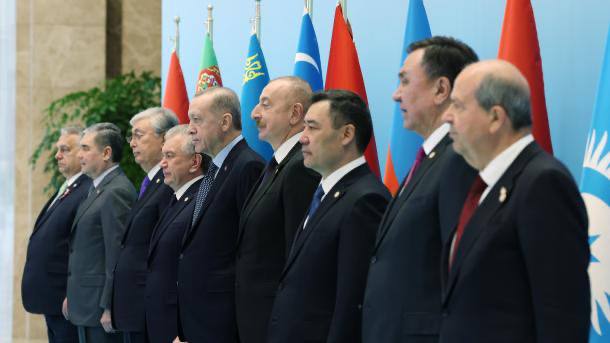THE DREAM OF A SINGLE TURKESTAN

To be honest, I was overjoyed when I read the news in the press about the creation of a common Middle Turkic alphabet consisting of 34 letters. As a linguist, my excitement was somewhat subdued by the thought that language is primary. After all, in order to have a common alphabet, it is necessary to have a Middle Turkic language that everyone can understand. It is true that there were times when the Turk understood the Uzbek, the Uzbek the Tatar, the Uighur the Kazakh, and the Kazakh the Kyrgyz without difficulty. Why, back then, our alphabet was the same, and everyone understood each other well through writing. It is said that the Chinese living in the south and north do not understand each other at all in spoken speech, and that they only find a language because of their writing. Of course, our writing is not hieroglyph, but if our alphabet were mixed, related languages would become intelligible to each other, like our Kipc, Karluk, and Oglyphic dialects. In this sense, I think it would be more expedient if the common Middle Turkic language were based on the Old Uzbek (Chigatoy) language. Moreover, our brothers and sisters should not object to the fact that the great Navoi language is a common language. When I think of the proverb, I am reminded of the wise proverb of our people: "A bear eats a divided, and a wolf is divided." Indeed, people have long known the benefits of living together in communities. It is not surprising that the historical figures who built great empires also acted with the intention of ensuring a safe and prosperous life in centralized powers, not out of greed and bloodiness. To give a simple example from life, the former Shoro Empire, although kept its people in cages, provided its security and basic necessities to the best of their ability. But when the cage was taken over the former allied republics, the plagues that had previously been brewing in the pan-pan befell them. First came the scourge of nationalism, then cost-effectiveness, religious fanaticism, then separatism, and, finally, today, the chauvinism of great statesmanship, the naïve former empire, which threatens the peace and security of the whole world. The peace of small states and peoples living in peace is being disturbed as a result of the great game of the great reigns that consider themselves hegemons. It was not easy for such small countries to live. According to the calculations of economic scientists, states with populations of less than 300 million people cannot be called truly independent. And the large countries that have the ability to be fully self-sufficient, on the other hand, are counted with the finger. Only China, India, the United States, and a few countries with large populations can exist without committing to anyone or anything. All the other 200 or so states always need one thing or another. Let's say a rich country like Japan is dependent on the outside world for raw materials. Or that the powerful industry of the Federal Republic of Germany was tied to Russian gas. Not to mention Russia. This country's industry cannot function at all without Western technology. Subsequent events made this clear. Right now, the aerospace industry there is almost paralyzed. In particular, the production of aircraft and space technology is in a state of decline. On top of that, the demographic situation in the country is deteriorating day by day. The ongoing war in Ukraine is increasingly debilitating the country's economy, as they say, "Chips on pain." The reason for all this: the former empire is a parocane, and the severance of the bonds of cooperation with the world. It follows, then, that the only acceptable way for peoples and countries is to unite on the basis of common interests. In the former Shoro reign, peoples were united under the banner of building a legendary just society – communism. The current European Union, on the other hand, was originally created under the name of the "Common Market" on the basis of purely economic interests.
fayozafar, [13.11.2024 15:17]
Today, Russia, isolated on the international arena, is looking for new ways of cooperation with the countries of the world. Initially, these organizations were the CIS, the Customs Union, later the established Euro-Asian Economic Union, the SCO, the BRICS. But they could not all become a solid association without a conflict of interest. Now Moscow offers the countries of the world an economic-political project "Global South". The essence of this project is based on the competition of authoritarian states with the democratic world on various fronts. That is, it is envisaged that the Third World countries, led by Russia, China, India and Brazil, will enter into competition with the Seven Power Powers and test the hegemony of the United States. As a first step in this direction, it is planned to abandon the dollar payment instrument and thereby derail the US financial system. Therefore, the members of the association, aware that the topic of the next conference of BRICS members in Russia was directed against the US dollar, limited themselves to the participation of the deputy finance ministers in the meeting. After all, almost all of them conduct their mutual financial relations through the American dollar. So how much can the BRICs go against the dollar? At the same time, it is inconceivable that the largest Asian countries, China and India, which have historically been dog-cats for a lifetime, will unilaterally agree on this issue.
In such a turbulent time, the pressing question of who should be with Jonajan Uzbekistan naturally makes us all think. The policy of multilateral neutrality pursued by our esteemed President and our government has stood the test of time and justified itself. But at a time when the attempt by great powers to redivide the world by soft power is on the rise, it is also unwise to watch these events with a handshake. As we wrote in one of our previous articles, Switzerland, a neutral country that has been pursuing a neutral policy for 500 years, has also launched a movement to unite around the European Union and NATO in today's dangerous times. Under such circumstances, we too have to think about who we will be with. In our opinion, the most rational way to do this is for our fraternal peoples to unite in common interests. The greatest achievement of our peoples in the next period is independence. On this basis, if the old and new independent Turkic countries were to unite and enter a single geopolitical space, this would give a positive direction to the history and fate of Turkestan. Historically, artificially fragmented Central Asia needs reunification today more than ever. Our newspapers remember that the First President of our independent country called for the unification of new independent states under the slogan "Turkestan is our common home". Editor's ChoiceAll Today, at a time when new and new geo-political plans are being drawn up by various powerful powers of the world, in order not to become dependent on other great powers, the time itself requires that the Turkic peoples also have their own political, economic and cultural project. Failure to meet the requirements of the times creates inevitable problems that cannot be solved in the future. Turkestan has long been a competitive ground for the surrounding major powers. That's because we've always been prey to the influence traps of different empires, not coming along with each other. The major empires that have made good use of it have been fighting continuously for centuries to take over Turkestan. As a result of the February Revolution in Tsarist Russia in 1917, there was a real opportunity for the peoples of Turkestan to reunite and create their own national state.
fayozafar, [13.11.2024 15:17]
The February bourgeois revolution had opened a new page in the history of our country. Its main slogans were freedom, equality, brotherhood. It was no coincidence that the great writer Abdulhamid Shepherd celebrated this historical event in the Great French Revolution. In short, this revolution awakened the peoples of the land from their strange slumber. In a short time, the political consciousness of the local population grew at an unprecedented level thanks to the efforts of the Jadids. As a result of this action, on November 27, 1917, at the kurultay convened in the city of Kokand, the formation of the Turkestan Autonomy was announced. According to the plan of the founders of autonomy, it was necessary to create a multinational, secular, new state based on democratic attitudes. The emerging Turkestan Autonomy as the first democratic and modern state in Central Asia, unfortunately, did not last long. The state was defeated by the Bolsheviks in February 1918 and relegated from the stage of history.
At this point, the legitimate question arises: "Why did the Bolsheviks need the end of autonomy?" To find the answer, we need to read what these people have to say about it. In his appeal "To all working Muslims of Russia and the East", published on November 20, 1917, V.I. Lenin, the sage of the Red Revolution, promised that a free new life was beginning, that all Muslims in Russia and the East could live freely and freely as they wished, and that the oppressed peoples of Tsarist Russia would henceforth be under the protection of the Soviet of Workers', Peasants' and Soldiers' Deputies. Unfortunately, it was this "defender" Red Army that drenched Kokand Autonomy in blood. In Alamza, the Dashnak army slaughtered thousands of autonomists. The elder Russian poet Maxim Gorky wrote about this in an article published in the magazine Novaya Zhizn in 1918: "Whatever the consequences of their policies, the Bolsheviks served the Russian people. If they did not provoke the whole mass from a point of stagnation and provoke an active reaction to reality in the whole mass, the country was doomed to inevitable destruction" (Novaya Zhizn magazine, No. 210). From these statements it can be understood that it is not difficult to see that the main goal of the October Revolution was not to give freedom to the oppressed peoples, but to keep the crumbling Russian Empire within its actual borders, to preserve the "Russian world", in modern terms, from the waves of the February Revolution. Indeed, the new Russian Red Empire, known as the USSR, lasted another 74 years, and in 1991 it fell into disrepair. After that, the newly independent republics of Central Asia began to feel the need for reunification. In the mid-90s of the last century, under the slogan "Turkestan is our common home", a major international conference was convened in Tashkent under the leadership of prominent writers Chingiz Aitmatov and Odil Yakubov. On the basis of this idea, an organizational structure was founded, its own bank and newspaper. However, soon, as we said above, the borders in the middle were re-strengthened and a visa regime was introduced. Each republic began to develop along its own territorial division.
However, in today's dangerous times, there is still a great need for coexistence among the countries of our region. The emergence of several political poles in the world also encourages the Turkic peoples to unite around one center. This need is not "pan-Turkism" or "new Turkish imperialism," as some opponents panic, but rather a necessary unification in the face of impending talotums. During the Shora period, the peoples of the region were organized around a common goal, albeit on the basis of utopian false communist ideas. The boundaries between them were also symbolic, creating a specific division of labor in the economy. The military district in the region was also called Turkestan, reminding us that our ancient history and destiny are sealed.
fayozafar, [13.11.2024 15:17]
As we have noted, as a result of the collapse of the Red Empire, the peoples of the Turkestan land were also entwined in the crust of their national borders. Someone raised their eyes of hope to America, someone to Europe, someone to Turkey, someone to Iran. Points of conflict and conflict arose due to various factors. Even border conflicts have arisen. Deeply concerned about this, the intelligentsia began to put the idea of Turkestan unity on the agenda again on the basis of the old friendship and brotherhood between the peoples of the region. After certain disturbing events on a global scale in 2014-2015, unification efforts began again in the Turkic world. A two-day summit of the heads of Turkic-speaking countries was held in Bodrum, Turkey. The high-ranking meeting, hosted by the then President of Turkey Abdullah Gul, was attended by the leaders of Kazakhstan, Turkmenistan, Kyrgyzstan and Azerbaijan. The presidents agreed to strengthen political and economic integration within the framework of concrete projects. The summit also discussed the creation of a common history book and a common Turkic alphabet. It was the fourth summit of the Cooperation Council of the Turkic World. At that time, the leadership of the Republic of Uzbekistan for some reason could not take part in the conference. After the election of Shavkat Mirziyoyev as president, serious positive changes took place in this area. First of all, bilateral relations between the neighboring republics of Central Asia have been improving. The borders were opened and the reciprocal visa regime was canceled. In 2019, after ten years, our country joined the Cooperation Council of Turkic-speaking States. Joining of our country in this organization gave new meaning to the work of Council. Yes, indeed, today there is a great need for all the peoples living in Central Asia to unite around a common common interest. Indeed, as the poet wrote:
The space that is broken into pieces –
Today you need it, Father, Turkestan!
If not only in our region, but all the Turkic nations of the world were united and united, they would never have become dependent on the other major powers of the world. It can be said that the first jubilee steps are being taken in this direction.
Khudoyberdi KOMILOV,
political commentator















